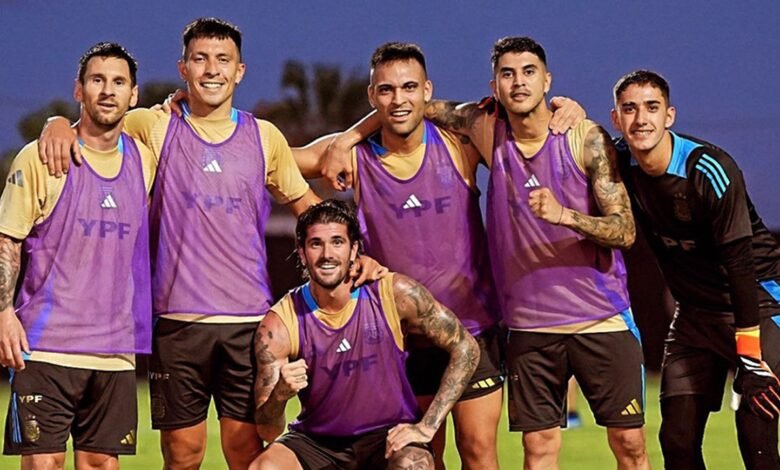Test de la Scaloneta: A Comprehensive Analysis of Argentina’s National Football Team Under Lionel Scaloni

Introduction
“Test de la Scaloneta” has become a popular phrase among football fans worldwide, particularly in Argentina. This term refers to the tests, challenges, and trials that the Argentina national football team has undergone under the guidance of Lionel Scaloni, affectionately dubbed “La Scaloneta.” The term not only signifies Scaloni’s tactical genius but also highlights the team’s resilience, grit, and undeniable growth in international football.
This article takes a comprehensive look at the Scaloneta phenomenon, from its origins and tactical brilliance to its most recent challenges. We will explore the journey that led to their triumph at the 2022 FIFA World Cup and how Lionel Scaloni’s leadership has reshaped the identity of Argentina’s national team.
Origins of the Scaloneta
Lionel Scaloni took charge of the Argentine national team in 2018, initially on an interim basis following the departure of Jorge Sampaoli after the 2018 FIFA World Cup. Few expected that Scaloni, a former Argentine international with limited coaching experience, would become one of the most influential figures in Argentine football history. Yet, Scaloni’s calm demeanor, tactical intelligence, and ability to foster unity among his players quickly earned him the respect of both players and fans.
The term “Scaloneta” became popular during Argentina’s journey to the Copa América 2021 title, a major tournament win that Argentina had sought since 1993. Fans and pundits alike began referring to Scaloni’s Argentina as “La Scaloneta,” a metaphorical bus driven by Scaloni that symbolized the team’s progress and unity under his leadership. The “Test de la Scaloneta,” therefore, refers to the various challenges and trials that Scaloni’s team has faced and overcome on their way to glory.
Tactical Evolution Under Scaloni
Scaloni’s tenure has been defined by tactical flexibility and pragmatism, qualities that have set him apart from his predecessors. Unlike coaches who stick rigidly to a single style of play, Scaloni has shown an ability to adapt his tactics based on the opposition and the strengths of his squad.
- Defensive Solidity: One of the early challenges for Scaloni was stabilizing Argentina’s often criticized defense. Under his leadership, the team developed a more cohesive backline, relying on disciplined positioning and team coordination rather than individual brilliance.
- Midfield Control: The “Test de la Scaloneta” has largely involved finding the right balance in midfield. Scaloni introduced dynamic players like Leandro Paredes and Rodrigo De Paul, who brought energy, creativity, and control to Argentina’s midfield. This marked a significant shift from previous teams, where the focus was predominantly on offense.
- Attacking Prowess: While Lionel Messi remained Argentina’s key player, Scaloni built a team that didn’t solely rely on the brilliance of one man. Lautaro Martínez and Ángel Di María played vital roles in diversifying Argentina’s attack. The squad adopted a more collective approach to scoring, enabling them to penetrate defenses with greater fluidity.
The tactical adaptability that defines the Scaloneta was a key factor in their successful run to the 2022 FIFA World Cup. Scaloni’s ability to manage high-pressure situations and make astute in-game adjustments is now widely regarded as one of his key strengths.
Test de la Scaloneta in the World Cup Journey
The biggest test of the Scaloneta came during the 2022 FIFA World Cup in Qatar. Argentina entered the tournament with high expectations, carrying the burden of a 36-game unbeaten streak and the weight of Messi’s potential last World Cup appearance. The journey was anything but easy, starting with a shock defeat against Saudi Arabia in their opening game. Many saw this loss as the ultimate “Test de la Scaloneta.”
However, true to Scaloni’s style, the team bounced back stronger. The key to their success was resilience, a hallmark of the Scaloneta era. Every match that followed was a testament to the team’s ability to adapt, with Scaloni rotating his squad to find the best tactical setup for each opponent.
Argentina’s victory over the Netherlands in the quarterfinals was a critical test of their mental strength, with the game going down to a nerve-wracking penalty shootout. Scaloni’s ability to keep his players focused in these intense moments played a pivotal role in their eventual victory.
In the final against France, Argentina faced another monumental test. The dramatic match saw both teams play out an exhilarating 3-3 draw, with Argentina ultimately prevailing in the penalty shootout. This victory not only secured Argentina’s third World Cup but also solidified Lionel Scaloni’s place as one of the most successful coaches in the country’s history.
The Impact of Scaloni’s Leadership
Lionel Scaloni’s leadership extends beyond tactics. His calm and humble demeanor has cultivated a strong sense of camaraderie within the squad. One of the most notable aspects of the Scaloneta is the harmonious environment in the dressing room, which contrasts with previous teams that struggled with internal tensions.
- Team Unity: Scaloni’s emphasis on team unity is perhaps one of the most significant reasons for the Scaloneta’s success. Players, regardless of their individual status, have been made to feel equally important. The emotional scenes after the World Cup win, where Lionel Messi was embraced not just as a captain but as a teammate, epitomized the solidarity that Scaloni instilled.
- Mentorship and Development: Scaloni has also shown a strong ability to nurture young talent. Players like Julián Álvarez and Alexis Mac Allister flourished under his guidance, further proving his capacity to manage generational transitions within the squad.
- Resilience in the Face of Criticism: When Scaloni was appointed, many questioned his lack of experience, but he silenced his critics through a series of calculated decisions and significant victories. The “Test de la Scaloneta” is ongoing, as Argentina’s national team continues to evolve under his leadership.
Conclusion: What’s Next for La Scaloneta?
As the “Test de la Scaloneta” continues, Lionel Scaloni and his team have already etched their names in football history. Winning the Copa América 2021 and the 2022 FIFA World Cup were monumental achievements, but there are still more tests on the horizon. Argentina will face new challenges as they seek to maintain their status as world champions, with upcoming international competitions and qualifiers offering fresh tests for Scaloni’s men.
In the end, the success of the Scaloneta is not merely defined by trophies but by the sense of unity, adaptability, and resilience that the team embodies. As Lionel Scaloni continues to lead the charge, the Scaloneta will undoubtedly face new challenges, but they do so with the confidence that they have already passed some of the toughest tests football can offer.




